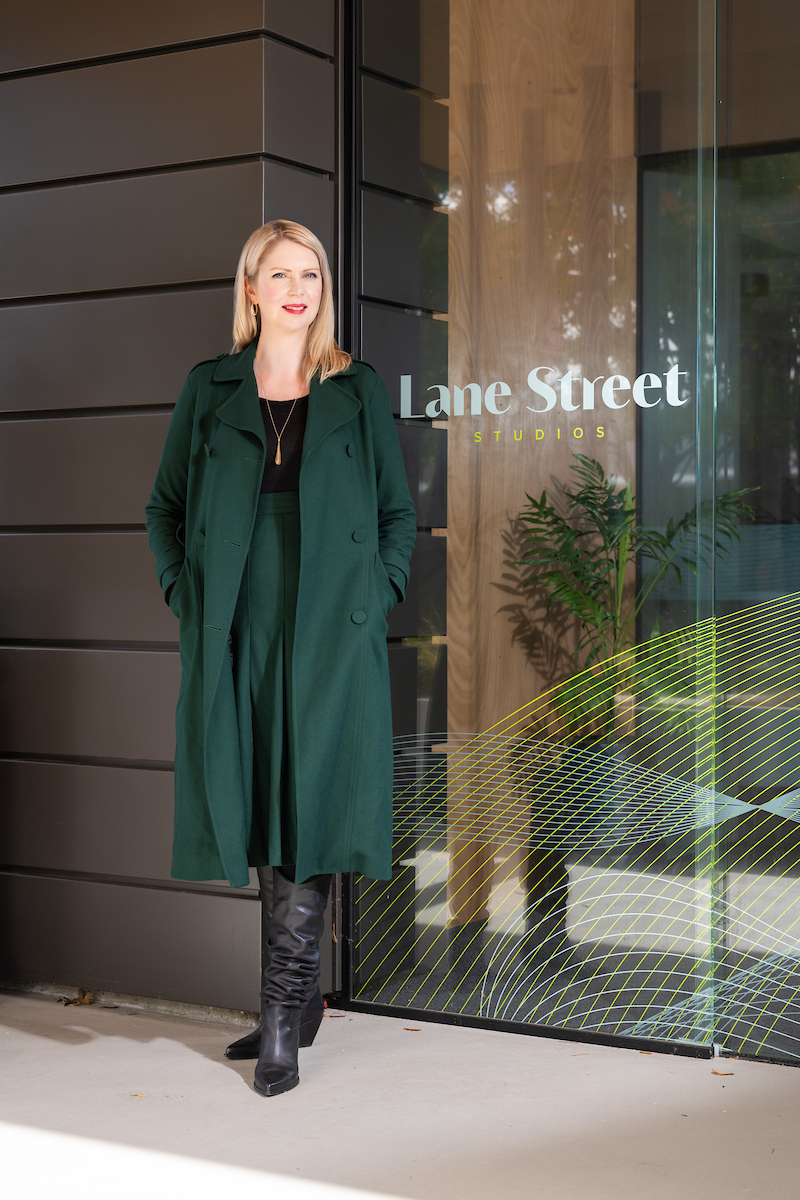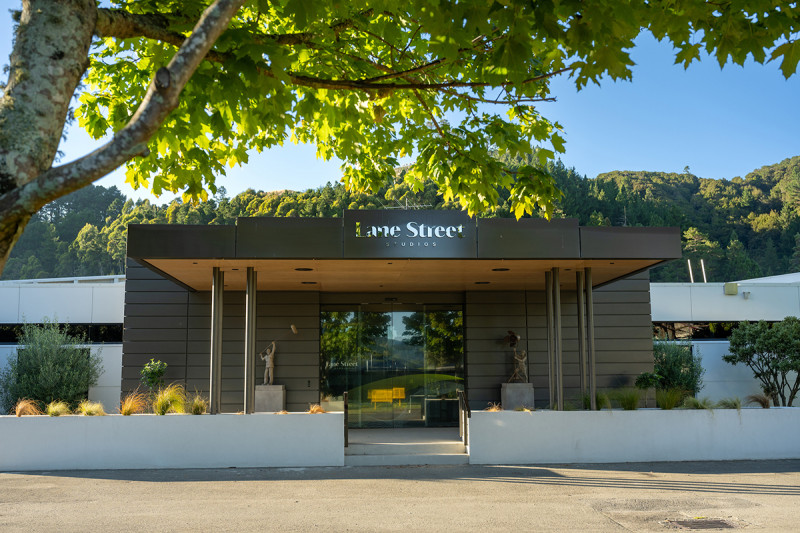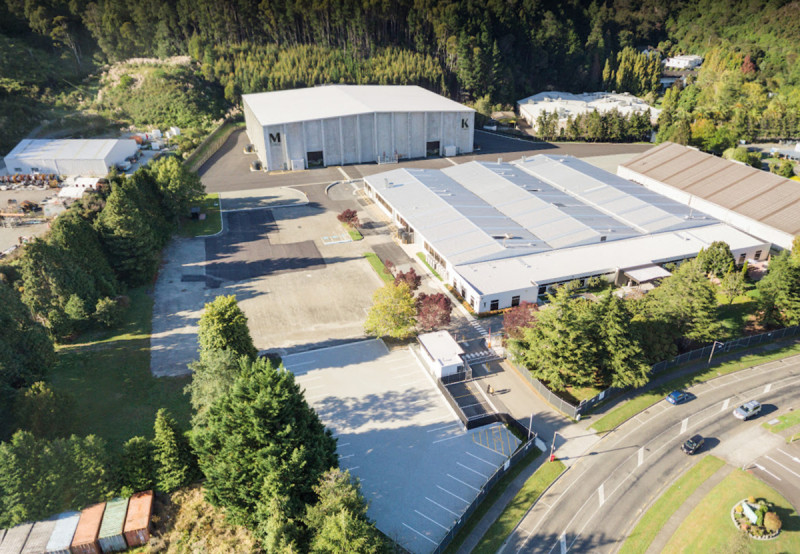
Photo by Stephen A'Court

Photo by Stephen A'Court

Wellington Silver Screeners: Kristy Grant by Alessia Belsito-Riera
In our Wellington Silver Screeners series, Alessia Belsito-Riera shines a spotlight on the movers and shakers working in the film capital of New Zealand.
2023 Wellingtonian of the Year finalist Kristy Grant worked for many years in business and infrastructure before transitioning into the film industry – though she’s always harboured a love of film, which she traces back to her brother. She recalls that when he would return home from his OEs they would bond over iconic 80s and 90s Kiwi cinema. Years later, after an encounter with Academy Award-winner Jamie Selkirk at the Roxy Cinema, Kristy dove headfirst into the film industry, starting youth programmes, helping build the Miramar Creative Centre, and opening the doors to her own Upper Hutt production space in 2023 called Lane Street Studios. She gave me the full low-down about what it’s like being on the business side of film.
Congratulations on your nomination for Wellingtonian of the Year!
Thank you! I’m actually quite pleased. It’s really positive for the team too, because it’s certainly been a joint effort and we’ve come through a lot together. We were building in the middle of a pandemic, we had the government revising the international attractions policy around screen and film, and then the strikes in Hollywood. I was quite surprised because Lane Street hasn’t been operating for too long, but I understand that it’s because I’ve done some other cool things before this, so it’s like an accumulation too.
Can you tell me about your career in business and how you transitioned into film?
Prior to working in this industry, I worked in international marketing, logistics, and trade. A lot of my work kept moving me out of Wellington and I really wanted to stay here because I love the city. So, I thought about how I could utilise my business skills in a different field. I started doing a part-time business development gig in Miramar, which is where the heart of the industry lies. I used to do some work from the Roxy Cinema, and I came across Jamie Selkirk, one of the owners and founders of Wētā. He was really accessible and open to my suggestions about how we could work together. He and I started work almost 10 years ago on a children’s short film competition called Roxy5 – Jamie was always keen to give back to young filmmakers. Then it grew from there.
Can you tell me about Miramar Creative Centre?
Roxy5 was really successful – pretty much all of the Wellington schools were involved. It was a way to practically teach children and give them a pipeline from education to industry, and it was for them to see that they could have a career in the industry. But that programme was for intermediate and high school level, and it was clear that there was a need at tertiary level in terms of having that same practical engagement and understanding. That’s when we started thinking about how we could run a programme at university level. It took a lot of planning and discussion and it’s something that I worked on for many years. There were 13 different iterations of the Creative Centre before we eventually partnered with Victoria University of Wellington – Te Herenga Waka. We started working on the development of the concept and the physical infrastructure. Planning on that probably started in 2015, and it was finished in 2017. Everything I do is in the vein of trying to connect people and give them opportunities to get into the space. Miramar Creative Centre is like a little mini studio on Park Road. It’s got editing suites, studios, space for foley and stunts and costume. It’s a great little compact, realistic environment. I still feel very proud of that space.
What drove you to start Lane Street Studios in Upper Hutt?
There was a family in Upper Hutt who were looking at a concept. They had been talking to some producers about studio builds, because in 2018 there was a report that had been issued showing the potential of the demand for a lot more studio space infrastructure, and so they really wanted to get involved with it. They asked what that could look like and I recommended it be the same quality of studios that’d been built already. What we wanted to deliver was something world class, custom-built, and that acts as a real attraction piece for getting people to come to New Zealand and then to Wellington. That project started in earnest in 2019 and construction was only completed in 2023. We consulted with a lot of people to find out very specifically what the space required because the industry has grown in New Zealand quite organically in scale – it’s gotten bigger and bigger and bigger. We thought, ‘What would help in terms of having everything ideally in one space?’ There’s always gonna be room for more but as much as possible, we’ve tried to make everything available. The building flow follows a production’s natural process for each department, but at the same time it’s completely flexible – it can be moved and changed around. The level of thought and consideration that’s gone into the finished build quality is really great. It’s being tested at the moment with the first major long-term production. We’re really pleased with what we built. We’ve had a lot of support from the local community. People just get in behind you – there have been a lot of noisy trucks barrelling up and down the streets for a couple of years during construction and people were kind and patient. There’s a bit more space out there to expand and it reminds me of what New Zealand was like in the 80s, so I really enjoy the community that’s out this way.
What is the day-to-day like at Lane Street Studios?
What’s wonderful about it is that it does change every day. And I feel like some of the work that we do is really beneficial. So, for example, this week a lot of my days are spent attracting incoming productions and having that consistency of workflow for the studio. Relationships, conversations, preparations, and proposals take a lot of work so that takes a lot of my time because, effectively, what we’re trying to do is ease the transition of moving massive production into the country. We try to find a comprehensive snapshot of what it’s like to live and work in New Zealand. At the moment I’m also spending time planning our next round of training programmes. One programme called CBP, Creative Business Programme, we started developing about six years ago. What it does is teach transferrable skills that are applicable to this industry and outside it to young creatives, filmmakers, people who want to help. It’s based on sector-specific content creation but it’s fundamentally a skillset I used to transfer into the sector. Day-to-day we oversee the facility with Pippa [Drakeford], in terms of ensuring that it’s functional and safe. And then coming to the end of March, I’m working on budgets and forecasts with Rachelle [Andrews]. It’s quite business focused, but around production needs and what’s coming next.
What’s special about Wellington’s film industry?
What’s unique about our sector here is the range and depth of experiences that people, crew, and productions have here. I think the dedication, the personalities, the level of passion, and absolute hard work that goes into the process here says a lot. I think that the New Zealand attitude of just getting stuck in, getting it done, finding a solution, and the resilience and robust nature of the crew here from that experience really shows on screen. That’s why people want to come and use our crews and production teams. That’s why we’re the UNESCO City of Film. There’s such a body of work behind what’s been created in Wellington. It’s very much a tried and tested concept that people can rely on coming to Wellington, because it’s a significant investment coming to New Zealand.
What advice would you give someone who's trying to get into the film industry?
I love this question. I just always want to support the young ones coming into the industry and offer assistance wherever I can. I’m grateful for the work that I do. We’ve worked really hard, but we really do try to share what we’ve learned.
Hustle – and I mean in a positive way, not taking advantage of people but working hard, making contacts, and connecting the dots. The biggest thing is networking. You’ve got to find likeminded people who are working on projects. It’s getting in the door, so go to screenings, go to the Q&As where the producer or the director is there. Be brave, ask them something, go and talk to them afterwards. Talk to the people behind the scenes like me, make contact. Understand your strengths as an individual and what they specifically are – that’s your point of difference. Get involved: one of the first projects that I was working on was helping the Roxy Cinema clean and prepare for The Hobbit premiere. I had been a really senior businessperson before that; I’d run a whole team of 70 people across the country and then I was doing dishes at 5am at the Roxy. Get stuck in but, at the same time, know your value. Be there to help and it will pay off – just be patient with that. We have some young aspiring filmmakers that we’ve worked with for over eight years as part of the Roxy5 and I see them now all around the industry. Keep in touch with people, grow that network, and get stuck in with a skillset as your own point of difference. And just keep going.
View more articles from:
« Issue 218, April 23, 2024

